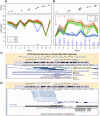Sequence polymorphisms cause many false cis eQTLs
- PMID: 17637838
- PMCID: PMC1906859
- DOI: 10.1371/journal.pone.0000622
Sequence polymorphisms cause many false cis eQTLs
Abstract
Many investigations have reported the successful mapping of quantitative trait loci (QTLs) for gene expression phenotypes (eQTLs). Local eQTLs, where expression phenotypes map to the genes themselves, are of especially great interest, because they are direct candidates for previously mapped physiological QTLs. Here we show that many mapped local eQTLs in genetical genomics experiments do not reflect actual expression differences caused by sequence polymorphisms in cis-acting factors changing mRNA levels. Instead they indicate hybridization differences caused by sequence polymorphisms in the mRNA region that is targeted by the microarray probes. Many such polymorphisms can be detected by a sensitive and novel statistical approach that takes the individual probe signals into account. Applying this approach to recent mouse and human eQTL data, we demonstrate that indeed many local eQTLs are falsely reported as "cis-acting" or "cis" and can be successfully detected and eliminated with this approach.
Conflict of interest statement
Figures

References
-
- Jansen RC, Nap JP. Genetical genomics: the added value from segregation. Trends Genet. 2001;17:388–391. - PubMed
-
- Rockman MV, Kruglyak L. Genetics of global gene expression. Nat Rev Genet. 2006;7:862–872. - PubMed
-
- Jansen RC, Nap JP. Regulating gene expression: surprises still in store. Trends Genet. 2004;20:223–225. - PubMed
-
- Hughes TR, Mao M, Jones AR, Burchard J, Marton MJ, Shannon KW, et al. Expression profiling using microarrays fabricated by an ink-jet oligonucleotide synthesizer. Nat Biotechnol. 2001;19:342–347. - PubMed
Publication types
MeSH terms
Substances
LinkOut - more resources
Full Text Sources
Other Literature Sources

